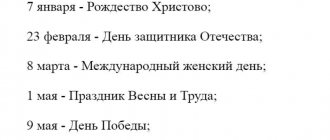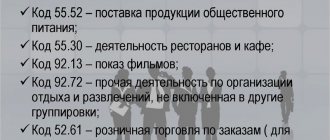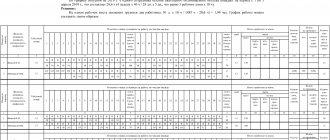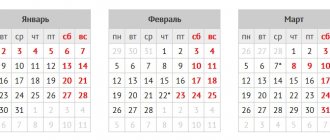Initial positions
The duration of weekly continuous rest is regulated in the Labor Code of the Russian Federation (LC RF) by literally three small articles (110, 111 and 113), but this problem should be considered on a much broader scale.
Since all parameters of rest time are closely interrelated with working time, in order to fully understand the intricacies of this issue, it is better to start with the basic concepts. 1. Working hours
This is the period during which a person performs his or her job duties. The duration is determined by the employment contract and internal documents of the organization. There are different types and modes of working hours. The first (working hours of normal duration, reduced, part-time) vary in duration, the second (irregular working hours, flexible schedule, shift work, summed up, dividing the day into parts) are graded depending on the order of distribution of working hours during the day, week or other accounting periods .
2. Rest time
This is the period when a person is free from work. By the way, it also includes the route to and from work. There are several types:
- breaks during the day,
- daily rest,
- weekends (weekly rest),
- holidays,
- vacation.
Labor Code of the Russian Federation
All information about the duration of weekly continuous rest is prescribed in three small articles of the Labor Code of our country. 110th, 111th and 113th, to be more precise. However, since each parameter of rest time is inextricably linked with the number of hours a person spends at work, this topic must be considered in depth. And it’s worth starting with the basic concepts.
So, working hours. This is the period during which a person is engaged in fulfilling his work duties, in accordance with the schedule and conditions specified in his contract. How many hours it lasts is also determined by this document. It is important to note that the types of working hours differ. There is “normal”, abbreviated and incomplete. Modes, by the way, are also customary to separate. There are irregular working hours, shifting, flexible, and also cumulative.
And the time allocated for rest is also divided into types. There are breaks during the day, vacations, holidays and weekends. And daily rest, of course, has its place.
With a shift work schedule, how to correctly calculate the rest time between shifts?
1. The duration of weekly continuous rest is calculated from the end of work on the eve of the day off until the start of work (shift) on the day following the day off. It depends on the type of working week (5-day or 6-day), shift schedule, and length of the working day.
2. Article 110 of the Labor Code of the Russian Federation states that the minimum duration of weekly continuous rest - 42 hours - must be observed by all employers when establishing working hours and shift schedules (including in continuous production).
When recording working hours in aggregate, the duration of weekly uninterrupted rest can be reduced in individual weeks in comparison with the established commented article. However, on average for the accounting period this norm must be met. This rule applies in particular to communications workers with a special nature of work.
In accordance with clause 9 of the Regulations on the peculiarities of the regime of working time and rest time for communication workers with a special nature of work (approved by Order of the Ministry of Communications of Russia dated September 8, 2003 N 112 // RG. 2003. N 185) for shift workers, and Also, for workers whose working day is divided into parts, the duration of weekly uninterrupted rest can be more than 42 hours and can be reduced to 24 hours. But during the accounting period (month, quarter), the duration of weekly continuous rest must be at least 42 hours.
In an operating mode with cumulative accounting of working hours, days off may be provided to employees according to the shift (work) schedule. When drawing up a schedule, the norms for the duration of weekly rest on average for the accounting period must also be observed, i.e.
Weekly continuous rest includes the time from the end of work on the eve of the day off until the start of work (shift) on the next day after the day off. Its duration depends on the type of working week (5-day or 6-day), shift schedule, and length of the working day.
The minimum duration of weekly continuous rest is 42 hours (Art.
Korovina's working days will be:
- in April - 1, 5, 9, 13, 17, 21, 25 and 29;
- in May - 3, 7, 11, 15, 19, 23, 27 and 31;
- in June – 4th, 8th, 12th, 16th, 20th, 24th and 28th.
In total, in the second quarter of 2013, Korovina must work 23 shifts (8 shifts 8 shifts 7 shifts). The working hours worked by Korovina will be 552 hours (24 hours × 23). The standard working time for the second quarter of 2013 is 469 hours. Processing in a pre-selected mode will be 83 hours (552 hours - 469 hours.
) or about 3.6 hours (83 hours: 23) per shift. To optimize Korovina’s work and reduce workload, her shift must be reduced by 3.61 hours per shift. Then during the accounting period she will work 469 hours (20.39 hours × 23). In this mode, processing is zero (469 hours - 469 hours). This regime is beneficial to both the employee and the organization.
According to Part 1 of Art. 5.27 of the Code of Administrative Offenses of the Russian Federation for violation of the provisions of the Labor Code, including failure to provide full hours of rest, provides for administrative punishment in the form of a fine.
In accordance with paragraph 1 of Art. 64 of the Civil Code of the Russian Federation, upon liquidation of a legal entity, calculations for the payment of severance pay and wages are made secondarily after claims for payments for causing harm to life and health. A similar rule applies to individual entrepreneurs (Article 134 of the Bankruptcy Law).
Declaring an employer bankrupt is considered by the legislator as a basis for providing employees with special guarantees ensuring the implementation of their labor rights, incl. the right to timely and full payment of wages.
6. Federal state supervision of compliance with labor legislation and other regulatory legal acts containing labor law norms, including inspections of the completeness and timeliness of payment of wages and the implementation of state guarantees for wages;
7. Responsibility of employers for violation of the requirements established by labor legislation and other regulatory legal acts containing labor law norms, collective agreements, and agreements;
In relation to wages, the main violation of employers is the delay in payment of wages. This violation entails adverse consequences for the employer.
Firstly, the employer pays compensation for each day of delay in payment of wages.
Secondly, managers and other officials of organizations guilty of delaying the payment of wages may be subject to disciplinary (Articles 195, 362, 419 of the Labor Code of the Russian Federation), administrative (Article 5.27 of the Code of Administrative Offenses of the Russian Federation) and criminal (Article 145.1 of the Criminal Code of the Russian Federation) liability.
Thirdly, an employee can resort to self-defense of his right to receive wages on time and in full (Article 142 of the Labor Code of the Russian Federation), i.e. suspend the performance of labor duties until the employer fulfills its obligations.
Other violations of the legislation on wages, for example, non-payment of bonuses, payment of overtime work, may entail administrative liability for the employer (Article 5.27 of the Code of Administrative Offenses of the Russian Federation). If the requirements of a collective agreement or agreement are violated, for example, on establishing an additional payment of a certain amount for work at night, the employer may be held administratively liable under Art. 5.31 Code of Administrative Offenses of the Russian Federation.
In the most general form, the rules of conduct for employees (their basic rights and obligations) are defined in Art. 21 Labor Code of the Russian Federation. In accordance with this article, the employee is obliged to comply with the rules of technical regulations and observe labor discipline. In each specific organization, these rules are specified in a collective agreement, agreement, local regulations, and employment contract.
To ensure labor discipline, it is necessary to create appropriate organizational and economic conditions for normal production activities. Creation of such conditions in accordance with Part 2 of Art. 189 of the Labor Code of the Russian Federation is assigned to the employer. Formulated in it in a general form, the employer’s obligation to create the conditions necessary for employees to comply with labor discipline is specified in other articles of the Labor Code of the Russian Federation and the Federal Law, in other regulatory legal acts containing labor law norms, a collective agreement, an agreement, local regulations, and an employment contract.
So, in accordance with Part 2 of Art. 22 of the Labor Code of the Russian Federation, the employer is obliged to: provide employees with the work stipulated by the employment contract; provide them with the means necessary to perform their labor duties; ensure safety, security and occupational health; pay employees wages in full and on time; provide for the everyday needs of employees related to the performance of their job duties, etc.
The state of labor discipline largely depends on the employer’s fulfillment of these duties: with poor organization of work, delays in payment of wages, etc., an increase in violations of labor discipline is observed.
The obligation of the employee and the employer to observe labor discipline means, first of all, the obligation to comply with the work schedule established by the employer. The labor schedule is determined by the internal labor regulations.
As a general rule, an employer has no right to force someone to work on a day off. However, there are exceptional situations when this is permitted. Their list is contained only in the Labor Code of the Russian Federation; references to any other regulations are illegal.
According to the Labor Code, a person can be called to work only if he does so voluntarily and gives his written consent.
You can call without consent only in two cases:
- To prevent or eliminate the consequences of a disaster, natural disaster, accident or accident.
- If it is necessary to work under conditions of emergency or martial law, as well as any force majeure that poses a threat to the lives of the population.
Disabled people and women with children under 3 years old can be recruited only if their health allows them. Teenagers under 18 years of age and pregnant women are prohibited from being called to work on a day off in any case.
For work on days off, double pay is provided. At the same time, at the request of the employee, he can receive an additional day of rest as compensation. Then the calculation will be as follows: for work on a day off - payment in a single amount plus one unpaid additional day off.
The minimum duration of weekly continuous rest is 42 hours (Article 110 of the Labor Code). It must be observed in all organizations when establishing operating modes and shift schedules (including in continuous production). An exception to this general rule may be cases provided for by the Labor Code, other federal laws and other regulatory legal acts adopted in accordance with them.
Based on Part 3 of Article 111 of the Labor Code of the Russian Federation, if the employer does not suspend work on weekends, employees are entitled to alternate days off based on the internal labor regulations (hereinafter referred to as the VTR Rules).
Therefore, with a shift schedule, days off can be any day of the week (for example, Wednesday or Friday). This depends on the procedure for their provision established in the VTR Rules.
It should be remembered that the internal labor regulations:
- approved by the head of the organization (or his authorized person);
- subject to examination by employees against signature.
Weekly uninterrupted rest
In accordance with Articles 21.107 of the Labor Code of the Russian Federation, an employee is entitled to weekly days off, which is one of the types of rest time.
The main norm regulating this issue is the provisions of Article 111 of the Labor Code of the Russian Federation. In particular, they established that:
- with a “five-day week” the weekend is two days;
- with a “six-day week” one day off is provided;
- As a general rule, Sunday is a day off for both the “five-day” and “six-day” days.
The question of what is the minimum duration of weekly continuous rest is answered by Article 110 of the Labor Code of the Russian Federation. It follows from this that the total time of continuous rest on weekends should be at least forty-two hours.
Rostrud, in Letter dated January 20, 2014 N PG/13281-6-1, notes that for some types of work with a “special nature”, when accounting for working hours in aggregate, the duration of days off can be reduced on the basis of the corresponding regulatory legal acts. However, based on the results of the accounting period, the corresponding rest time must be made up to employees up to the established standard.
The employer must remember that forcing employees to go to work on weekends is prohibited. Such work can only be carried out with their consent, expressed in writing, except for situations directly specified in Article 113 of the Labor Code of the Russian Federation.
Weekly uninterrupted rest, days off
1. All employees are provided with days off (weekly continuous rest). With a 5-day work week, employees are provided with 2 days off per week, with a 6-day work week - 1 day off.
*Weekends are days off from work in the calendar week, provided to employees for rest.
Some categories of workers, in addition to general days off, are entitled to additional days off. Thus, one of the parents (guardian, trustee) to care for disabled children, upon his written application, is provided with 4 additional paid days off per month, which can be used by one of these persons or divided among themselves at their discretion.
Women working in rural areas may be granted, upon their written request, 1 additional day off per month without pay.
One of the parents (guardian, trustee, foster parent) working in the Far North and equivalent areas, having a child under the age of 16 years, upon his written application, is granted an additional day off every month without pay (Article 319 of the Labor Code of the Russian Federation ).
2. The general day off is Sunday. The second day off in a 5-day working week is established by a collective agreement or VTR rules. Both days off are usually provided in a row.
*For the purpose of rational use by employees of weekends and non-working holidays, the Government of the Russian Federation may transfer weekends to other days (Part 5 of Article 112 of the Labor Code of the Russian Federation).
3. For employers whose work suspension on weekends is impossible due to production, technical and organizational conditions, days off are provided on different days of the week in turn to each group of employees in accordance with the VTR rules.
* This applies, in particular, to employees of continuously operating organizations where work cannot be interrupted on a general day off due to the need to serve the population (shops, transport organizations, theaters, museums, etc.).
Working on weekends is generally prohibited. An exception is made for cases provided for in Art. 113 Labor Code of the Russian Federation.
- In a classic five-day work week, the days off are Sunday and Saturday, which means that workers will have 48 hours of rest. And taking into account the fact that, as a rule, the last working day - Friday - is also a short day on the basis of Art. 95 of the Labor Code of the Russian Federation, the rest period will increase by several more hours.
- With a six-day schedule there will be some difficulties. The fact is that, on the basis of Art. 91 of the Labor Code of the Russian Federation, the working week should not last more than 40 hours, which implies not only shorter shifts, but also the correct distribution of working time, because even with such a schedule, no one has canceled the norms of minimum rest.
- It should also be taken into account the fact that, on the basis of Art. 95 of the Labor Code of the Russian Federation, a work shift on Saturday cannot last more than 5 hours. This norm is provided precisely in order to comply with the minimum period of rest, which will be exactly 42 hours, if we take into account the end of the work shift at 14:00 on Saturday and the beginning of the next working week at 8:00 on Monday morning.
- The calculation of rest during shift work also has its own characteristics, because inter-shift and weekly rest are different concepts that are regulated not only by the norms of the Labor Code of the Russian Federation, but also by federal legislation. In particular, for workers in the transport industry, Order No. 15 of the Ministry of Transport establishes a rest standard of at least double the duration of the shift, which can range from 9 to 12 hours.
- Separately, it should be noted the flexible work schedule, in which working hours on the basis of Art. 102 of the Labor Code of the Russian Federation are established by agreement with the employer. With such a schedule, it can be difficult to comply with the standards, because the employee can be involved at different times of the day and week with long breaks during the working day. However, despite the specifics of this type of work, employers are still required to comply with the minimum 42 hours requirement.
at least 42 hours. Thus, according to clause 7 of the Regulations on the peculiarities of the working time and rest time regime for employees of organizations engaged in the extraction of precious metals and precious stones from alluvial and ore deposits (approved by Order of the Ministry of Finance of Russia dated April 2, 2003 N 29n // BNA RF. 2003 . N 31), weekly rest for the specified employees is provided according to the schedule of at least one day during the calendar week.
3. When applying Article 110 of the Labor Code of the Russian Federation, it should be taken into account that the procedure for providing weekly continuous rest to employees of railway, road and water transport and some other industries may be regulated by provisions on working time and rest time in these industries. For example, in accordance with clause
22, 23 Regulations on the peculiarities of the working time and rest time regime for workers of the floating composition of inland water transport vessels (approved by Order of the Ministry of Transport of Russia dated May 16, 2003 N 133 // RG. 2003. N 181) during the navigation period during long-term mooring of ships in loading and unloading points, and at points of registration, crew members, upon their written application, may be provided with accumulated rest days on any day of the week.
In this case, the duration of continuous rest for crew members cannot be less than 24 hours. In other cases, accumulated rest days are provided by agreement with the employee. The order of their provision during the navigation period is established by the captain (commander, skipper) of the vessel, taking into account the opinion of the elected body of the primary trade union organization or other representative body of workers (see also commentary to Article 329).
A weekly continuous rest for car drivers in accordance with the Regulations on the Peculiarities of Working Time and Rest Time for Car Drivers must immediately precede or immediately follow the daily (between shifts) rest, and its duration must be at least 42 hours.
When accounting for working time in total, weekends (weekly continuous rest) are set on different days of the week according to work schedules (shifts), and the number of days off in the current month must be at least the number of full weeks of this month. For intercity transportation, when working hours are calculated together, the duration of weekly rest can be reduced, but not less than 29 hours. On average, during the accounting period, the duration of weekly continuous rest must be at least 42 hours (clauses 26, 27, 28).
A minimum of 42 hours of weekly rest is established by law; it cannot be set less, provided that the employee is busy performing duties most of the week.
Moreover, this norm may be changed in some weeks and be only 24 hours, but in the end, the norm must be met within a month.
If the profession is specific, for example, a vehicle driver, then the duration of the weekly rest period is at least 45 hours.
- If we consider the classic version, then workers rest for over 48 hours, that is, beyond the norm, since this includes Saturday and Sunday, plus the rest of the short working day - Friday.
- With a 6-day work week, meeting the minimum 42 hours off work is somewhat difficult, since only Sundays remain at 24 hours, which means that daily shifts must be reduced to the established minimum worker employment per week of 40 hours. In this case, the last working day, Saturday, will have to be shortened to 14.00 hours in order to meet the 42 hours established by law.
- With a flexible schedule, the frequency of the employee’s employment is agreed upon with the employer when signing the employment contract. In this case, it is quite difficult to determine the frequency of an employee’s rest, since the schedule may provide for the specialist’s employment at any time of the day, however, even here the required 42 hours a week for rest must be observed.
- In addition, specific professions have a separate history; the frequency of rest in this case is provided not only by the Labor Code of the Russian Federation, but also by Federal legislation:
- For example, for drivers, the maximum shift is 9 - 10 hours daily or a maximum of 56 hours per week; during the shift, a break of 45 minutes is required after 4.5 hours. All this indicates compliance with the established minimum of 45 hours weekly, which may be reduced to 36 hours at certain periods, but at the end of the period it is compensated by additional rest periods;
- For railway workers, the calculation of weekly rest is based on the duration of stay on the road, and here tours are taken into account for the calculation period, but the total duration of rest is certainly 42 hours.
How to correctly draw up an order establishing part-time work – read the article at the link.
In addition to the mandatory weekly rest, employees have the right to a break necessary for eating and rest, as provided for in Art. 108 Labor Code of the Russian Federation.
Types of rest time.
At the same time, for a daily break, the law provides for a minimum and a maximum of 30 minutes - 2 hours.
If there is no possibility or conditions for a work break, the employer is obliged to provide conditions for employees to have lunch and rest during work. To do this, it is necessary to equip a special room with everything necessary, where workers can eat and rest a little.
Here you will learn how to properly maintain a time log at an enterprise.
Involvement in the performance of labor functions on weekends is permitted by the Labor Code in several cases:
- the employee agrees to work outside of working hours;
- the employer received written consent from the employee to interrupt his days off.
The issue of involvement in work during the rest period is resolved unilaterally in the event of emergency situations, industrial accidents, or natural disasters. The duration of weekly uninterrupted rest must be ensured at the standard level in any force majeure situation in relation to pregnant employees and minor workers.
If you find an error, please highlight a piece of text and press Ctrl Enter.
What is weekly uninterrupted rest?
This is the period from the end of the last hours of work until the start of the next shift.
The size of such a gap cannot be less than the minimum established by law and its distribution depends on the specifics of the working period, the shift schedule and the duration of one shift. If the recording of working time is carried out in total, then the duration of rest may be less than the legally established period in some weeks, but in general for the reporting period the norm is necessarily observed.
The legislative framework
The provisions on the holiday period are regulated by several legislative acts:
- Art. 106 of the Labor Code of the Russian Federation indicates the concept of a day off, and the ability of a citizen to manage it.
- The main act on the duration of weekly rest is Art. 110 of the Labor Code of the Russian Federation, while the requirements regarding the procedure for providing a period free from duties and its duration are indicated for all employers, without exception, regardless of the form of business.
- In addition to Art. 110 of the Labor Code of the Russian Federation indicates the duration of working hours in Art. 111 and 113 of the Labor Code of the Russian Federation, depending on the number of hours spent on work.
Labor Code of the Russian Federation Article 106. The concept of rest time
Rest time is the time during which an employee is free from performing work duties and which he can use at his own discretion.
Labor Code of the Russian Federation Article 110. Duration of weekly continuous rest
The duration of weekly uninterrupted rest cannot be less than 42 hours.
Find out how to apply for work on weekends here:
What is included in this holiday period
Art. 111 of the Labor Code of the Russian Federation determines that Sunday must necessarily be a day off, but with a 5-day working week, any day of the week can be included in Sunday at the discretion of management and enshrined in local acts of the organization.
Labor Code of the Russian Federation Article 111. Weekends
All employees are provided with days off (weekly continuous rest). With a five-day work week, employees are given two days off per week, and with a six-day work week, one day off. The general day off is Sunday. The second day off in a five-day work week is established by a collective agreement or internal labor regulations. Both days off are usually provided in a row. For employers whose work suspension on weekends is impossible due to production, technical and organizational conditions, days off are provided on different days of the week in turn to each group of employees in accordance with the internal labor regulations.
Important: if production is continuous, then another day of the week is provided for release from work, depending on the needs of the enterprise. That is, any day can become a free day instead of Sunday.
In any case, the employee has the right to rest and dispose of the provided hours at his own discretion.
It should be taken into account that the legislator has established a minimum limit for days off, but the maximum is not regulated, this indicates the ability of employers to independently regulate the duration of the weekly weekend period for the state, the main thing is that the minimum is maintained.
Indicator regulation
The duration of the weekend period may vary in accordance with the Regulations on the peculiarities of the working day regime, paragraph 9, for specialists with a special nature of work, working in shifts, as well as with a divided working day.
What a rotating work schedule is and what its features are, you will find out in the link.
In this regard, rest per week can be 24 hours, or it can exceed 42 hours, but at the same time for a month it amounts to the legally established norm.
The concept of days off.
If the accounting of working hours is summarized, then days off for specialists are determined according to the shift schedule, and the norms must be observed.
Here you will learn how to correctly draw up a shift schedule when recording working hours.
For special categories of workers, such as railway workers, sailors, drivers, the work and rest schedule is prescribed in the local regulations of the enterprise.
Article 110 of the Labor Code of the Russian Federation. Duration of weekly uninterrupted rest
This rule must be observed in all organizations, regardless of organizational and legal forms, when establishing working hours and shift schedules. The duration of weekly continuous rest is calculated from the end of work on the eve of the day off until the start of work (shift) on the day following the day off.
In this regard, according to the authors, when determining the duration of such rest, it is the provisions of the Labor Code of the Russian Federation that are subject to application. 2. In a number of cases, the duration of continuous rest is established by separate regulatory legal acts. In accordance with clause 11 of the Resolution of the Council of People's Commissars of the USSR “On working time and rest time in enterprises and institutions switching to a continuous production week,” which is in force insofar as it does not contradict the Labor Code of the Russian Federation, the duration of daily rest (between shifts, etc.
Important
At the same time, for certain categories of workers, as a rule, those having a special nature of work, regulatory legal acts stipulate that, with a cumulative accounting of working time, the duration of weekly uninterrupted rest can be reduced in certain weeks compared to that established by law. However, on average for the accounting period this norm must be met. For example, in accordance with clause 9 of the Regulations on the peculiarities of working hours and rest time for communication workers who have a special nature of work, for workers working in shifts, as well as for workers whose working day is divided into parts, the duration of weekly continuous rest can be more than 42 hours and can be reduced to 24 hours.
But during the accounting period (month, quarter), the duration of weekly continuous rest must be at least 42 hours.
- Important
Labor law
- Protection of employer's rights
- I have a short 6 hour shift at the end of my shift, I ask the employer to reschedule it for another day. On this day I already have a 5 hour shift, and the result is an 11 hour shift.
If not officially established
What number of hours, in this case, should correspond to the minimum duration of weekly uninterrupted rest? Also 42 hours. The only problem is that no one can guarantee this to a person. Because he did not sign an employment contract, which means that he is officially (according to papers) considered unemployed. And the manager, theoretically, can call him to the site at any time, detain him overtime, demand that he work on weekends or holidays.
Of course, bona fide institutions do not do this. The duration of weekly uninterrupted rest must be at least 42 hours - and every manager knows this provision. But on construction sites, for example, all of the above is practiced. Therefore, official work is a kind of legal insurance against such cases.
Results
The legislator determined the types of rest, its duration, and working time standards. The purpose of this is to ensure that the employer respects the right of employees to rest.
As a general rule, the minimum duration of weekly continuous rest is 42 hours, the maximum is not limited. When recording working hours in total, the minimum can be reduced to 24 hours.
Involvement in work on weekends is possible only with the consent of the employee. The only exceptions are force majeure circumstances.
Involvement in special cases
On weekends, going to work is prohibited on a general basis; this is regulated by Part 1 of Article 113 of the Labor Code. But it is still possible to call someone to work if there are circumstances of special significance. To do this, the manager must comply with no less important formalities under Part 8 of Article 113 of the Labor Code of the Russian Federation - that is, make an order in writing.
All employees called to work must be familiarized with it, under personal signatures. This means the employee’s consent to be hired to work on his legal day off, as enshrined in Part 2 of Article 113 of the Labor Code. This includes cases of the need to perform urgent and unforeseen work, on which the normal functioning of the institution in the future depends.
Without the written consent of the employee, a call to work is also allowed (Part 3 of Article 113 of the Labor Code). These are force majeure circumstances: preventing a production accident or eliminating its results, reducing the impact of a natural or man-made disaster.
As well as urgent work due to the introduction of a state of emergency or martial law. Then the calling procedure becomes as simplified as possible, but also provided for by law.
Also, Part 5 of Article 113 of the Labor Code of the Russian Federation mentions the general rule according to which recruitment to work is possible not only with the written consent of the employee, but also with the involvement of the elected body of the trade union of the enterprise and taking into account its opinion. This includes other cases where the duration of weekly uninterrupted rest becomes shorter than generally accepted.
Article 153 of the Labor Code of the Russian Federation provides for a provision for increased wages for workers if they are involved in activities on weekends.
Basic Concepts
Labor law establishes what the duration of weekly continuous rest should be (Articles 110, 111, 113 of the Labor Code of the Russian Federation). Working time refers to a person’s expenses for the implementation of his labor functions, expressed in hours and minutes. The volume of hours to be worked for a certain period is stipulated in the individual labor agreement; references to internal acts of the enterprise (for example, a collective agreement) are allowed.
Types of schedules, work on which is counted as full-time work activity:
- working days and shifts of standard length;
- shortened working days;
- Performing job duties on a part-time schedule.
Working hours directly affect the minimum duration of weekly rest. They are classified according to the rules for the distribution of hours worked over a single shift or a longer accounting interval:
- working under irregular working hours;
- implementation of a set of job functions in a flexible schedule;
- shift schedule;
- summarized working time recording;
- the working day is divided into several parts.
Rest time is characterized by complete release from official duties. These periods are formed due to the following time ranges:
- weekends – guaranteed weekly rest;
- short breaks during each shift;
- daily rest, which accompanies the end of the working day;
- holidays celebrated at the federal and regional level;
- paid and unpaid leave.
In accordance with Art. 189 of the Labor Code of the Russian Federation, labor discipline is obligatory for all employees to obey the rules of conduct determined in accordance with the Labor Code of the Russian Federation, other federal laws, collective agreements, agreements, local regulations, and employment contracts.
Labor discipline is a necessary condition (element) of any collective work, regardless of the organizational and legal form of the organization and the socio-economic relations that have developed in society. Without compliance with the established rules of behavior and labor discipline, it is impossible to achieve the goal for which the joint labor process is organized.
a) Regulate the internal labor regulations of the organization;
b) Establish mutual rights and obligations of employees and employers;
c) Determine incentive measures for success in work;
d) Determine measures of disciplinary liability of employees for unlawful behavior in the course of their work activities.
2. As an element of labor relations.
3. As one of the principles of labor law. Labor discipline, as a principle of labor law, is implemented through the rights and obligations of employees and employers. These rights and obligations are of a general nature and determine the meaning of the existence and development of the norms of the Institute of Labor Discipline.
4. As the actual behavior of employees and authorized representatives of the employer in compliance with the rules of conduct established in the organization in accordance with legal requirements.
- Urgent work under emergency circumstances (for example, epidemic, earthquake, flood or fire). In order to carry out necessary work in case of emergency or martial law. In other cases threatening the life of the population.
- Preventing damage or destruction of enterprise property. To protect against accidents.
- Preventing an accident or disaster at work, as well as eliminating the consequences afterwards.
Holiday non-working days do not apply to employees of those enterprises that conduct non-stop work caused by production and technical conditions. This category also includes employees of organizations providing continuous services to the population, employees whose duties include emergency unloading, loading and repair work.
However, the employee and the employer can enter into an agreement under which the employee will perform a labor function during periods falling on weekly continuous rest, providing the employee with additional benefits and benefits compared to the law. This agreement, based on the principle of discretion, can be recognized as inconsistent with the law only by agreement of its parties.
Therefore, this ban in practice may become a good wish. However, if the employer refuses to provide the employee with time for continuous rest during the calendar week, the employee can exercise this right independently, since the provision of this type of rest time does not depend on the discretion of the employer.
Info
Weekends in shift work How to set weekends in shift work In shift work, traditional weekends Saturday and Sunday can be included in the shift schedule as working days. In this case, the shift schedule will include any other days of the week as days off.
The courts also point to this, see, for example, the ruling of the Kaluga Regional Court dated March 17, 2014 No. 33-710/2014. How long should you rest after a shift in organizations with continuous production?
Another comment on Article 110 of the Labor Code of the Russian Federation
The commented article establishes the minimum duration of weekly continuous rest. The term “weekly uninterrupted rest” should mean free time from work on weekends.
The duration of weekly rest cannot be less than 42 hours.
When considering the commented article, the ruling of the Penza Regional Court dated July 24, 2012 in case No. 33-1719 is of interest, which established that in satisfying the claims to recognize the actions of the defendant in providing one day off per week as illegal, collecting underaccrued wages, as well as compensation for moral damage was rightfully denied, since the plaintiff actually works 2 hours a day, therefore, he has the opportunity to continuously rest for at least 42 hours a week. The plaintiff’s rights to rest were not violated by the defendant, which means that the defendant has no obligation to recalculate wages.
Bonuses.
The bonus system is a set of rules establishing indicators and conditions for bonuses; bonus amounts; frequency of bonuses; categories of employees covered by this type of bonus; source of financing.
1. Quantitative indicators;
2. Qualitative indicators;
3. Saving resources used;
4. Rational use of technology.
The condition for bonuses is usually work during the accounting period and achievement of established indicators. One of the most important conditions for bonuses is compliance with labor discipline. Employees who meet bonus targets but commit absenteeism or other disciplinary offenses do not acquire the right to a full bonus.
The size of the bonus is determined, as a rule, as a percentage of the tariff rate (salary). The size of the bonus for a particular employee is determined by the manager, taking into account the degree of fulfillment of indicators and bonus conditions.
The frequency of bonuses is monthly or quarterly. It is possible to establish bonuses that are paid based on the results of work for the year.
Regular bonuses, paid according to pre-approved indicators (in accordance with the bonus system), form part of the salary. They must be distinguished from one-time (one-time) bonuses, which are an employee’s encouragement for special achievements in work and are paid for completing particularly important tasks, in connection with holidays or special occasions, based on the results of shows or competitions (Article 191 of the Labor Code of the Russian Federation).
What is the duration of weekly uninterrupted rest for jobs with a continuous cycle?
Based on Part 3 of Article 111 of the Labor Code of the Russian Federation, if the employer does not suspend work on weekends, employees are entitled to alternate days off based on the internal labor regulations (hereinafter referred to as the VTR Rules).
Therefore, with a shift schedule, days off can be any day of the week (for example, Wednesday or Friday). This depends on the procedure for their provision established in the VTR Rules.
It should be remembered that the internal labor regulations:
- approved by the head of the organization (or his authorized person);
- subject to examination by employees against signature.
Minimum duration of weekly continuous rest for certain categories of workers
The Labor Code of the Russian Federation in Article 100 provides for the specifics of the work and rest regime of individual workers.
For example, such features exist in relation to the work and rest regime of vehicle drivers (Article 329 of the Labor Code of the Russian Federation. Order of the Ministry of Transport of Russia dated August 20, 2004).
In particular, as follows from paragraph 27 of the regulatory legal acts, approved by the said Order of the Ministry of Transport of Russia, the number of days off provided to the driver in the current month must be no less than the number of full weeks of this month.
Remote workers can also be classified as a separate category, for whom the legislation also provides for a number of legal regulation features.
In particular, unless otherwise follows from the contract, the rest time of a remote worker (including what should be the duration of weekly continuous rest) is determined by such an employee independently, without the participation of the employer (Article 312.4 of the Labor Code of the Russian Federation).









